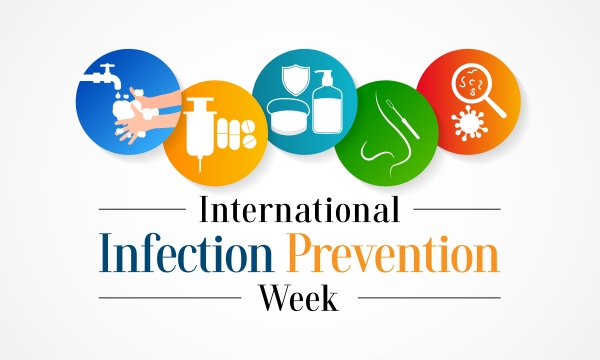Infection Control Week 15-21 October 2023

18/10/23
The 15th - 21st October 2023 is International Infection Prevention Week, shining a light on infection prevention and reminding us of the fundamentals for effective infection prevention. It’s a time to remind everyone of the simple steps we can all take to help stop the spread of infection. Our colleagues at Wirral Commmunity Health and Care NHS Foundation Trust have complied the below to help remind us all of what we should be doing to help prevent the spread of infection;
This year the Infection Prevention and Control Team have filmed a short video watch the video and written the article below, covering the fundamentals of infection prevention. These are:
- Hand hygiene
- Cleaning and disinfection
- Vaccination
- Personal protective equipment
- Respiratory hygiene (catch it, bin it, kill it)
- Injection safety
|
Hand Hygiene |
Hand hygiene is the single most effective way to prevent the spread of infections. Cleaning your hands frequently for at least 20 seconds will help keep you and others protected. Follow these seven steps for effective hand hygiene:
Find out more about hand hygiene in the IPC hub.
|
Cleaning and Disinfection |
Keeping equipment and the environment clean and free from dust is essential in preventing infection from spreading. It is important to recognise the difference between cleaning and disinfection:
- Cleaning physically removes germs/dirt (using detergent /hot soapy water). Cleaning does not kill microorganisms.
- Disinfection kills microorganisms but can only happen after cleaning has taken place.
To learn more about cleaning and disinfection please see chapter 1.6 and 2.3 and appendix 7 of the National Infection Prevention & Control Manual for England.
|
Vaccination |
As we head into the colder months, remember that COVID-19 and flu can be especially dangerous for those at higher risk of severe illness. Find out if you’re eligible and book your vaccination now.
Find out more about seasonal vaccinations and winter health on the NHS website.
Vaccines protect the person that receives them and those around them by being highly effective, safe methods of preventing communicable (infectious) diseases.
It is still possible to get sick from an infection after receiving the vaccine for it, however the severity of illness will be significantly less than if you are not vaccinated, decreasing the likelihood of hospitalisation and death from the illness.
This winter it is expected that many respiratory infections, including COVID-19 and flu may be circulating at high levels, putting those who are vulnerable at increased risk. This may put increased pressure on hospitals and other health care services. It is therefore very important to have your flu and Covid vaccines to protect yourself, your family, and those you care for.
|
Personal Protective Equipment (PPE) |
- Use PPE whenever there is an expectation of possible exposure to infectious material or bodily fluids
- Know the order in which to put on and take off PPE to reduce the risk of contamination
- Gloves are not a substitute for hand hygiene and hand hygiene must be performed after removal of gloves
- Always ensure stock levels are monitored and PPE is in date
Please see appendix 5a and 5b of the IPC manual for more information.
|
Respiratory Hygiene |
Watch this NHS video on YouTube, ‘Catch it, bin it, kill it: Stay Well This Winter’, to see how easily flu can be passed from person to person.
Display signage around your setting to encourage the message: ‘Catch it, bin it, kill it.’
Ensure you have plenty of tissues in your setting.
|
Injection Safety |
All of us, at some point in our lives, will have an injection to retain or restore good health. But sometimes injections that are intended to promote health do the opposite. This happens when they are given in an unsafe way which can lead to the transmission of life-threatening infections.
Staff who give injections should receive regular training and education on the safe handling, use and disposal of sharps whilst knowing what to do in the event of a sharps injury.
Get involved Follow us on X and tweet us @wchc_ipc with the #IIPW
|
For more information, visit www.wchc.nhs.uk or contact the IPC team: 0151 604 7750 or ipc.wirralct@nhs.net |
Contact us today




